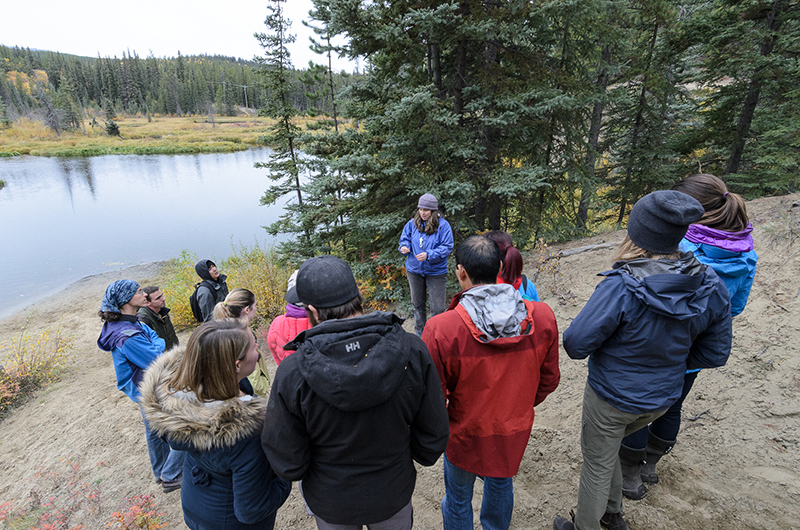
The major in northern systems, delivered jointly by the University of Alberta and Yukon College, is tailored to students of environmental and conservation sciences who want to learn about the distinct culture of Canada's Far North.
Two UAlberta environmental and conservation sciences students are the first to move their studies to Whitehorse for an entire winter semester, as part of a new element in a unique program of study.
The program is a major in northern systems, delivered jointly by the Environmental and Conservation Sciences program (ENCS) in the Faculty of Agricultural, Life and Environmental Sciences (ALES) and Yukon College.
The major is for students seeking an education in the distinct culture of Canada's Far North, as well as a bachelor of science degree focused on its environment.
"It's basically all the things that I'm passionate about in one spot-an abundance of wildlife, beautiful landscapes and a culture that is very connected to the land," said Taylor Lund, a third-year conservation biology student.
Both Lund and fourth-year student Jessica Hayes became the winter term's inaugural participants because they wanted a closer perspective on life in Canada's Far North.
"A huge part of conservation biology is being able to convey science to the rest of public," said Lund. "So if you can understand people and the way they live, it makes it easier to speak their language-it's creates a personal connection."
The program was created eight years ago to allow northern residents to earn a university-level science degree without leaving their community. Since then, it has also attracted students enrolled in ENCS in Edmonton, and from other programs and places.
The specialized study for the major occurs in years three and four of the ENCS program and includes such pertinent topics as Northern land-use planning and climate change.
Many of its Edmonton-based students participate in its winter field school, which this year runs from February 16 to 23, or in the river-based summer field school that was added last summer.
Whether students go North for a semester, take their courses in Edmonton, or attend full-time in the Yukon, the program is eye-opening and timely, says Fiona Schmiegelow, director of the Northern ENCS Program.
"A major strength of the programming is that we make sure that Indigenous perspective is woven throughout the curriculum," she said.
Additionally, "it's an absolutely fascinating point in the history of the North; there is a real opportunity to experience what's happening, firsthand."
The Yukon is significant in Canada because it has the largest number of land claims settled under modern treaties. Finalized in 1990, the Umbrella Final Agreement enables Yukon's First Nations to become self-governing. The Yukon also has its own Environmental and Socio-economic Assessment Act.
Those pieces of legislation, plus recommendations of the Truth and Reconciliation Commission of Canada in 2015, add important context to every facet of the curriculum, said Schmiegelow.
"For example, anything to do with wildlife must speak to the co-management of those resources by First Nations," said Schmiegelow.
The program adds traditional Indigenous knowledge to the curriculum alongside scientific methods, with the help of First Nations elders who give lectures, and provides abundant opportunities for outdoor learning.
"You're in a living laboratory when you're up there and for a student interested in northern ecology or environmental biology that's really profound," said Jim Bohun, assistant dean (academic and student programs) in the faculty.
Several adjunct faculty are government staff. "So students get a hands-on perspective by having senior government staff in the classroom with them, to get that experiential learning that comes with working in the field," said Schmiegelow.
"My future opportunities have greatly expanded through the BSc program being offered here," said David Silas, fourth-year student and citizen of the Selkirk First Nation in Yukon. "Plus, it is a huge advantage to be able to apply what I learn in the classroom to the immediate real world around me."
Employers of recent graduates include territorial, federal and First Nations governments; environmental organizations; industry and private consultancies.
To learn more, see Major in Northern Systems.